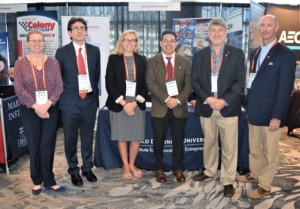Old Dominion University Launches the Open Seas Technology Innovation Hub
Sitting at the mouth of the Chesapeake Bay with a major commercial seaport and the world’s largest naval base, Norfolk is a natural location for the recently launched Open Seas Technology Innovation Hub. The establishment of the Open Seas Hub by Old Dominion University (ODU) was enabled by a challenge grant from the i6 program of the Economic Development Administration and is in partnership with the Virginia Institute of Marine Science, the College of William & Mary, the City of Norfolk, the Port of Virginia, and the Virginia Maritime Association.
Jerry Cronin, the Executive Director, hopes that his experience as a former U.S. Coast Guard officer and entrepreneur will help as he leads efforts to develop this regional center for maritime innovation and commercialization. Previously, Cronin created and spearheaded the TempO program at the Institute for Innovation & Entrepreneurship at ODU, which helps turn ideas into viable businesses.
Innovative solutions to big problems
The Open Seas Technology Innovation Hub hopes to find solutions to “wicked” and “intractable” problems in the maritime arena. “The southern end of the Chesapeake Bay is a petri dish for these problems, from industry and the military to sea level rise and fisheries,” said Cronin. Cronin specified that the Hub wants to “shake things up” and focus on “things that haven’t been solved and are costing industries millions of dollars.”

From left to right: Erika Marsillac, Ricardo Ungo, Emily Steinhilber, Rafael Diaz, Jerry Cronin, and Tom Allen. Credit: Emily Pavlik, Institute for Innovation & Entrepreneurship (IIE) at Old Dominion University
There are four areas of innovation that the Hub is focusing on: maritime and port operations, including ship building and repair, supply chain, and logistics; offshore wind; aquaculture and fisheries; and flood mitigation and resilience. The Hub wants to connect people who have the solutions for problems in these areas to the commercial market.
International implications of innovation
The Hub hopes to work with and leverage expertise from existing maritime innovation centers, such as the New York Maritime Innovation Center and theDOCK in Israel, to solve globally applicable problems. “We want to cast out the net and try to find the best minds out there and bring those people back to Hampton Roads to create,” said Cronin.
He hopes to form partnerships and run coordinated challenges with some of these centers around the world. For these challenges, a problem set would be presented for people to pitch their ideas. They would work with the winner to validate that there is a value proposition to the market, create a business model, and then find funding streams to support the idea.
“Sometimes you invent this great thing, but then you can’t find a buyer. This is the opposite – we see a problem, validate the market need, and help develop solutions…we help folks figure out a business model around a solution that actually solves a problem potential customers care about,” explained Cronin.
Once those solutions are identified, the Hub will work to commercialize those solutions and sustain the idea. Cronin emphasized that sustainment is a key component “because if you come up with a good solution, but you can’t sustain it, it won’t go anywhere.”
Benefits for the Bay
The Hub would create jobs and solve major issues affecting the Bay area. “Industries, folks impacted, innovators, professors, scientists, mad inventors – Norfolk is a great place to bring together all of these collaborators,” said Cronin. “If you’ve got more people with jobs and a livelihood, they’ll be living better lives and be happier,” Cronin stated.
Even though the Hub was launched recently, Cronin wants to start building relationships and engagement in all four key areas, as well as identify a starting cohort, immediately. He is eager to do a couple challenges, hopefully with local partners, like the Port of Virginia. “There are a lot of areas for innovation in those industries…and if those innovations help other areas, wouldn’t it be great if it came from a company on the Bay?”
He encouraged people to contact the Hub if they have an idea for a solution. “It is important just to get a dialogue started because you don’t want to be in a situation where someone comes up with something and you go, ‘I thought of that 10 years ago,’” Cronin explained.
Cronin concluded that, “People are passionate about the water, they’re passionate about the Bay. Let’s harness that and do some innovation and commercialization around it.”
